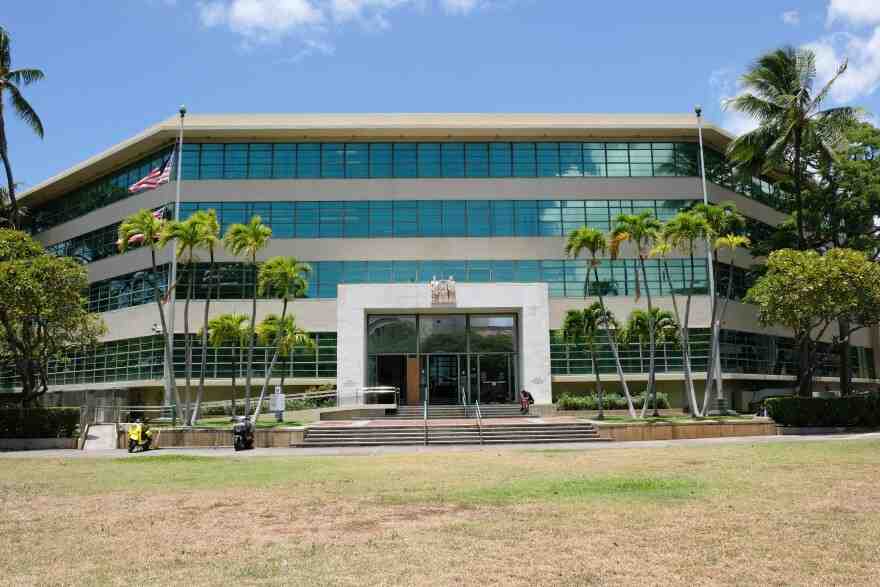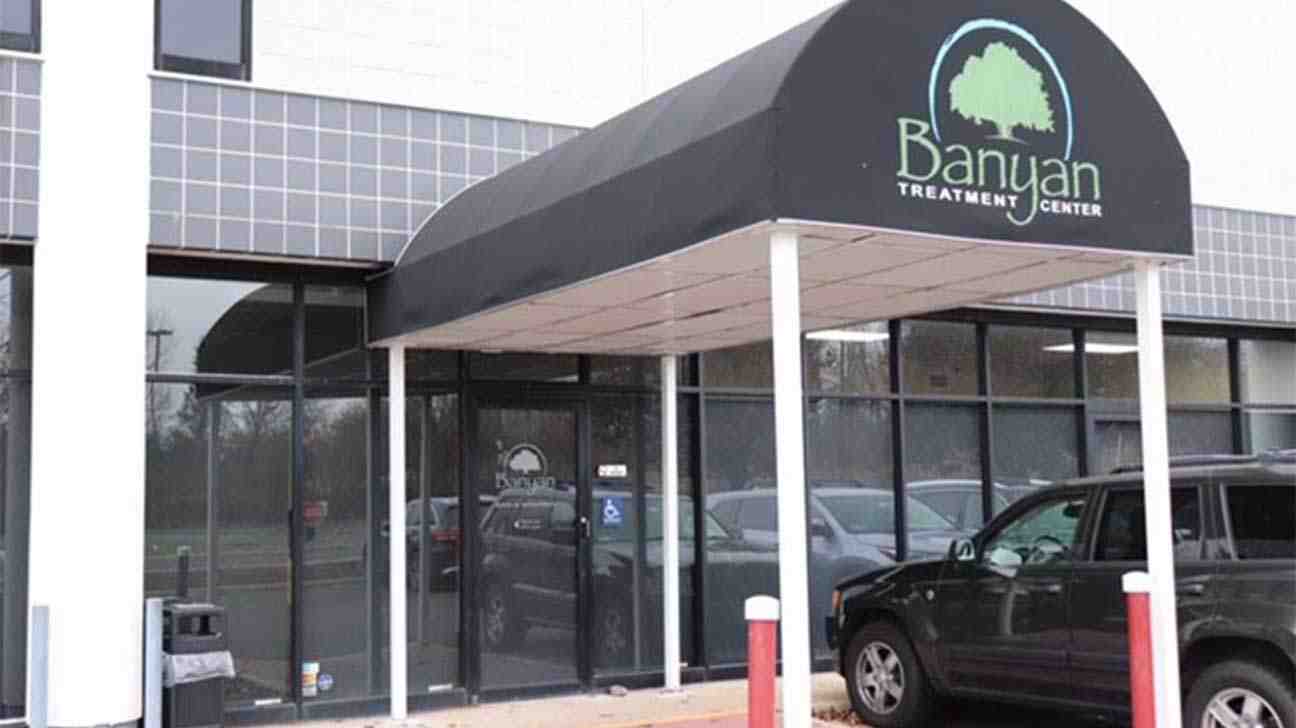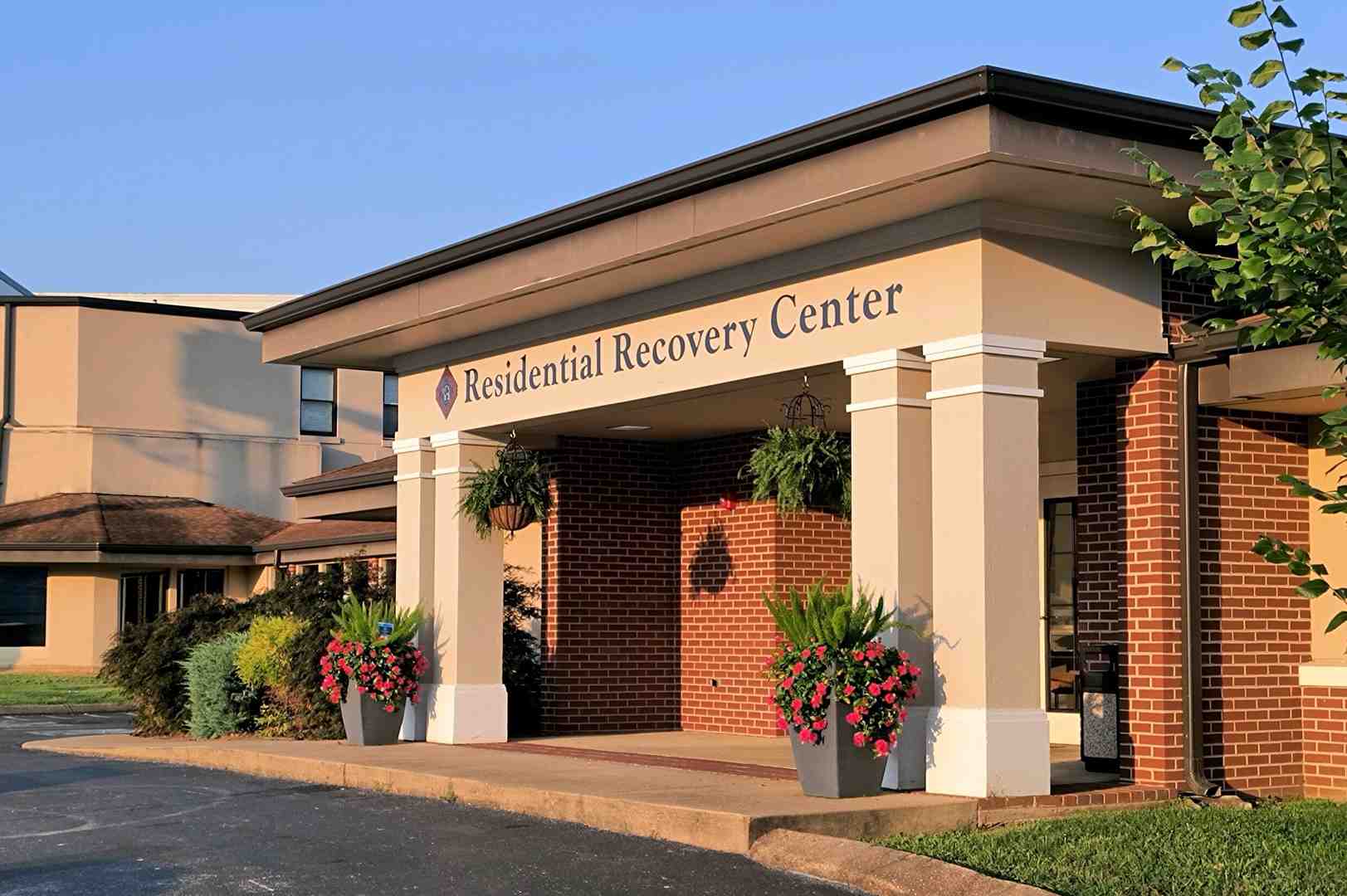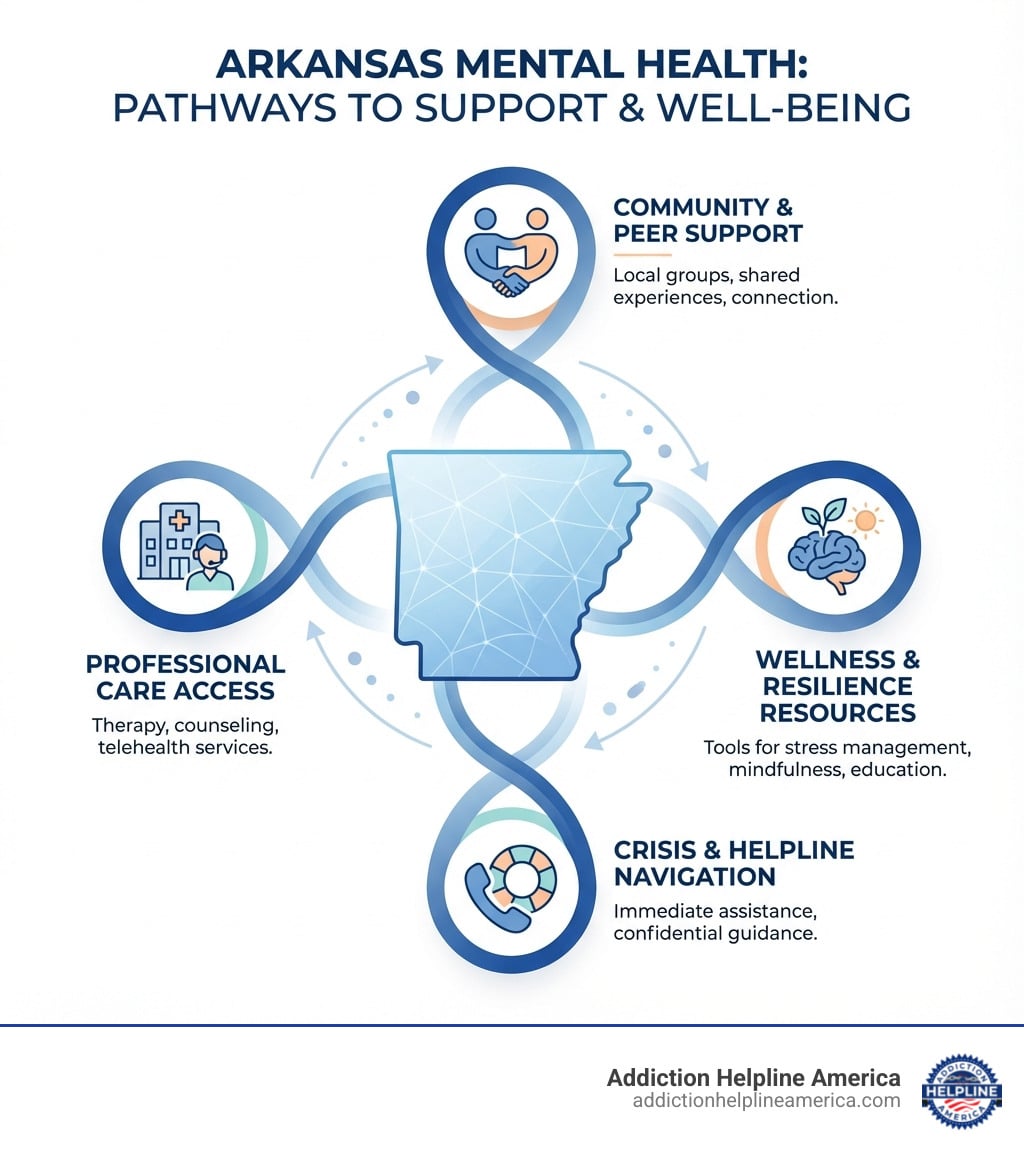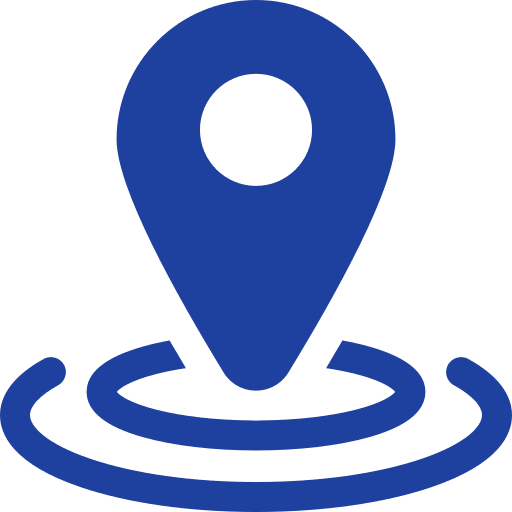
Understanding What Inpatient Drug Rehab Really Means
“Drug rehab near me inpatient” is a common search term, and I totally get why. When you’re facing addiction, you need serious help, and fast. Inpatient rehab is exactly that: a deep dive into recovery in a safe, supportive place, away from all the things that make staying sober so hard. It’s like hitting a pause button on life so you can focus on getting better.
Inpatient rehab gets you away from the daily triggers and stress that can derail your progress. You’re surrounded by doctors, therapists, and—most importantly—other people who truly understand what you’re going through. This sense of community is huge; it makes a world of difference.
The infographic below gives you a visual snapshot of what sets inpatient programs apart: the typical length of stay, how many therapy sessions you’ll have each week, and the overall success rate. It’s a powerful overview of the benefits of intensive treatment.
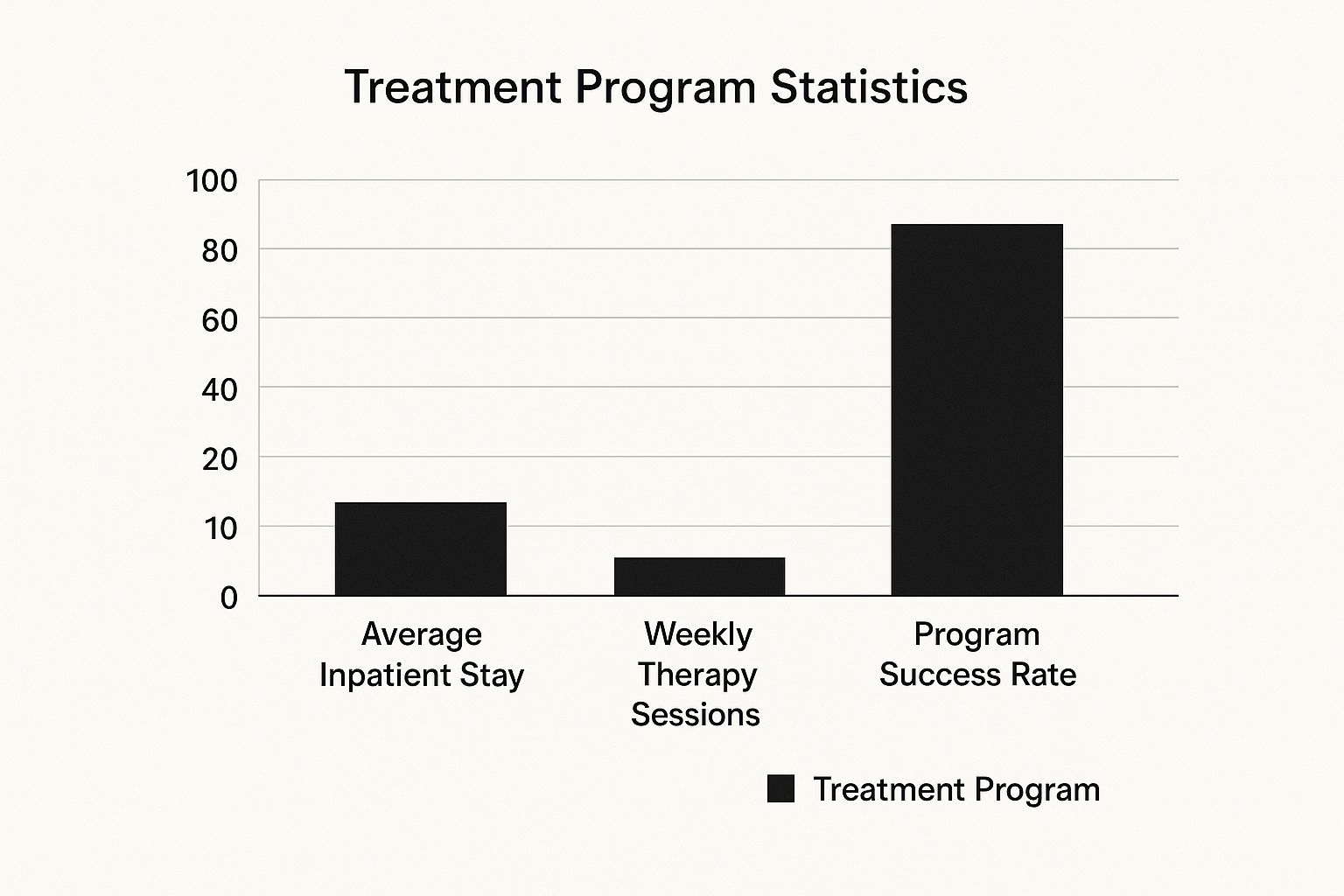
As the infographic shows, inpatient care is comprehensive. You’re in it for the long haul, with lots of therapy, and your chances of success are higher. Even though inpatient is a vital piece of the treatment puzzle, it’s not always easy to access. SAMHSA’s 2020 survey found that less than 25% of facilities offered residential (non-hospital) treatment, with only 18% offering long-term and 15% short-term options. The cost usually runs between $6,000 and $20,000 for a 30-day program. You can dig into these statistics further at Addiction Help.
What a Typical Day Looks Like
A typical day in inpatient rehab is structured, but it’s not like boot camp. There’s a good balance between scheduled activities and downtime for yourself.
- Mornings: You might start with medication (if you need it), followed by breakfast and a group meeting to get the day going. Individual and group therapy sessions are the cornerstones of your day.
- Afternoons: This is often when you’ll dive into other kinds of therapy, like art therapy or mindfulness exercises. You might also have educational workshops about preventing relapse.
- Evenings: Evenings usually involve 12-step meetings, group discussions, and quiet time to reflect on what you’ve learned throughout the day.
Before we talk more about program types, I want to give you a clearer picture of how inpatient stacks up against outpatient treatment. It’s a big decision, so making sure you have all the info is key.
To help you compare and contrast, I’ve put together this table highlighting the main differences:
| Inpatient vs Outpatient Treatment Comparison | |||
|---|---|---|---|
| Treatment Type | Inpatient | Outpatient | |
| Duration | 30-90+ days | Varies widely, often weeks to months | |
| Living Arrangement | On-site at the facility | At home, attending scheduled sessions | |
| Cost Range | $6,000-$20,000+ (30 days) | Generally lower than inpatient | |
| Best For | Severe addictions, requiring 24/7 support and removal from triggers | Mild to moderate addictions, individuals with strong support systems, able to manage daily life while attending treatment |
As you can see, inpatient rehab provides a much more immersive experience, while outpatient offers more flexibility. Think about your own situation, your support system, and how much structure you need to truly focus on recovery.
Call Now – Your Journey to Recovery Begins Today!

Take the first step towards a healthier life! Call now to connect with our compassionate team and start your recovery journey today. Your path to healing awaits!
Our recovery specialists are available 24/7 to provide support, and all calls are confidential and free. Reach out anytime – we’re here to help!
Types of Inpatient Programs
There are different types of inpatient programs because everyone’s situation is unique. These programs vary in length and how intensive they are.
- Short-term residential: This is usually a 30-day program that concentrates on detox and getting you stable.
- Long-term residential: These programs can last for several months, digging deeper into the root causes of your addiction and helping you build coping skills for the long run.
Choosing the right program can feel overwhelming. Trust me, I know. If you’re not sure where to turn, a great place to start is Addiction Helpline America. They can give you expert guidance. You can call them at 844-561-0606 or visit their website https://addictionhelplineamerica.com/ to get support and find an inpatient rehab near you. Finding the right fit is crucial. Don’t hesitate to reach out for help; it’s the bravest thing you can do.
Smart Research Strategies That Actually Work

Finding the right “drug rehab near me inpatient” can feel overwhelming. Generic online searches often bury you in sponsored listings and confusing medical jargon. So, how do you cut through the noise and find trustworthy treatment centers? It’s about smart research, not just endless clicking. Let’s ditch the digital maze and explore some practical strategies.
Going Beyond Basic Google Searches
Forget the endless scroll. Think about your local network. Healthcare providers, therapists, and even support groups are incredible resources. They often have firsthand experience with different facilities and can offer real-world insights you won’t find online.
For example, a therapist might know which local inpatient program specializes in treating specific addictions or co-occurring disorders. That kind of personalized recommendation is gold. Also, check with community organizations and churches; they often have connections to local treatment resources.
Checking State Licensing and Credentials
Don’t just take a facility’s word for it. Every state has a licensing database for rehab facilities. Use it! These databases are crucial for verifying credentials and ensuring the facility meets basic standards. You can find information about licensing status, past violations, and the types of treatment offered.
Think of it as your first layer of protection. But remember, a license doesn’t guarantee quality. It’s just a starting point. You still need to do your homework.
Understanding (and Questioning) Success Rates
“90% success rate!” Sounds great, right? But what does that even mean? Often, “success” is vaguely defined. Don’t be fooled by big numbers.
Dig deeper. Ask how success is measured. Is it based on completion rates, long-term sobriety, or something else entirely? A facility that’s open and honest about its outcomes is a good sign. If they avoid specifics, that’s a major red flag.
Picking Up the Phone and Asking the Right Questions
Once you’ve narrowed down your choices, pick up the phone. A simple conversation can tell you so much about a facility’s culture and approach. Ask about staff qualifications, treatment philosophies, and aftercare support.
Don’t be afraid to ask tough questions. What are their relapse rates? How do they handle challenging cases? Need help navigating the process? Resources like Addiction Helpline America at 844-561-0606 or their website https://addictionhelplineamerica.com/ can provide expert guidance.
Before we go further, here’s a handy table to help you organize your research and ask the right questions:
Essential Questions to Ask Treatment Centers
Key questions organized by category to help you thoroughly evaluate potential inpatient rehab facilities
| Category | Questions to Ask | Why It Matters | Red Flag Responses |
|---|---|---|---|
| Accreditation & Licensing | Is the facility accredited by a reputable organization (e.g., The Joint Commission)? Is it licensed by the state? | Ensures the facility meets minimum quality and safety standards. | “We’re working on getting accredited,” or vague answers about licensing. |
| Treatment Philosophy | What type of therapy do you offer (e.g., CBT, DBT)? Do you offer individualized treatment plans? | Different therapies are more effective for different addictions and individuals. | One-size-fits-all approach or lack of clear treatment methodology. |
| Staff Qualifications | What are the credentials and experience of your staff? What is the staff-to-patient ratio? | Ensures you’ll be receiving care from qualified professionals. | Unclear or evasive answers about staff qualifications or a high staff-to-patient ratio. |
| Aftercare Planning | What type of aftercare support do you provide (e.g., sober living referrals, support groups)? | Continuing care is crucial for long-term recovery. | Lack of a structured aftercare plan. |
| Cost & Insurance | What is the cost of treatment? Do you accept my insurance? | Understanding the financial implications is essential. | Pressure to commit before discussing costs or lack of transparency about insurance coverage. |
This table gives you a framework for comparing different facilities and identifying potential red flags. Remember, choosing the right “drug rehab near me inpatient” is a big decision. Take your time, ask questions, and trust your gut. These strategies will empower you to make an informed choice, one that sets you or your loved one up for lasting recovery.
Seeing Through Marketing to Find Quality Care
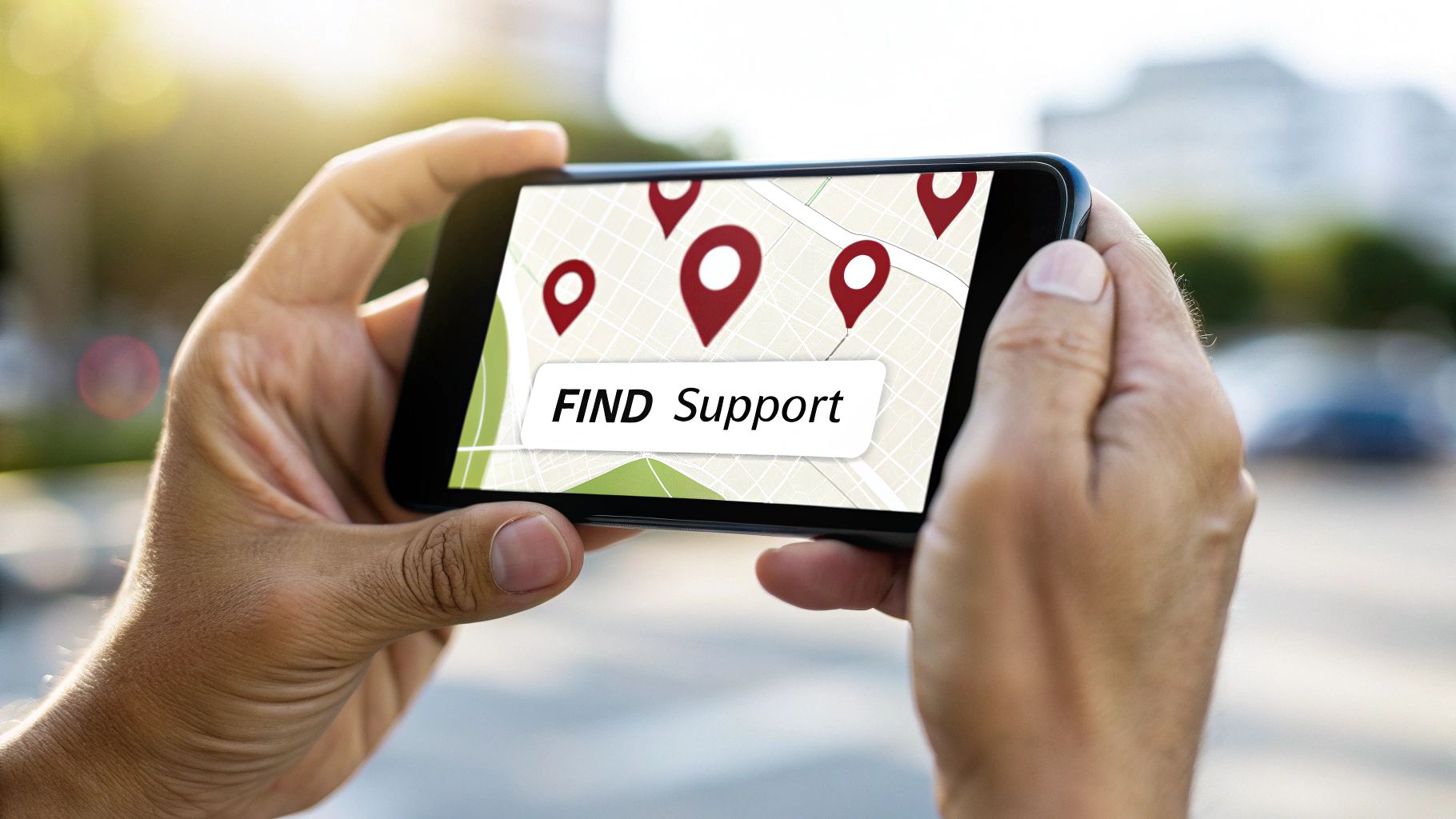
Finding a “drug rehab near me inpatient” requires more than just browsing through glossy brochures and reading glowing testimonials. Sure, those shiny websites can be tempting, but real quality care goes much deeper. It’s about peeling back the marketing layers and getting to the heart of what truly matters.
Decoding Accreditations and Certifications
Lots of facilities proudly display their accreditations. But here’s the thing: not all accreditations are equal. Some, like accreditation from The Joint Commission, are a real gold standard in healthcare, a solid indicator of quality. CARF International accreditation is another one that signifies a commitment to high standards. Others? Not so much.
Don’t just take the presence of an accreditation at face value. Go further. Actually look into the specific standards behind each one. This helps you understand what a facility really has to do to earn it, giving you a much better sense of their dedication to quality care. A facility that’s truly committed to excellence will be open and upfront about their accreditations and what they represent.
Assessing Staff Expertise: Beyond the Titles
It’s easy for a facility to claim they have a team of “highly qualified professionals.” But what does that actually mean in terms of your recovery? Look past the fancy titles. Dig into the specifics. How many licensed therapists are actually on staff? What are their specialties? Do they have experience treating your specific addiction or any co-occurring disorders you might have?
For example, if you’re struggling with opioid addiction, the facility should absolutely have staff experienced in Medication-Assisted Treatment (MAT). If trauma is part of your story, look for therapists trained in trauma-informed care. The right expertise can be transformative. This is where your research, especially those all-important phone calls, really comes into play.
Focusing on Evidence-Based Treatment Approaches
It’s crucial to understand which treatment approaches are backed by solid research and which ones are riding the wave of a current trend. Evidence-based practices, like Cognitive Behavioral Therapy (CBT) and Dialectical Behavior Therapy (DBT), have a proven track record of effectiveness in treating addiction. These therapies equip you with practical skills to manage cravings, navigate triggers, and ultimately, build a healthier, more fulfilling life.
Things like yoga and meditation can be valuable additions to a treatment plan – they can really enhance the healing process. But they shouldn’t be the entire focus. A truly solid “drug rehab near me inpatient” program will put evidence-based treatments front and center, incorporating complementary therapies in a thoughtful and supportive way. If a facility seems to be prioritizing trendy treatments over proven methods, it might be a red flag.
If you feel lost or overwhelmed, remember there are resources out there to help. Addiction Helpline America can provide guidance and support in finding the right treatment path for you. Call 844-561-0606 or visit https://addictionhelplineamerica.com/.
Finding the right inpatient drug rehab isn’t about the surface presentation. It’s about digging deeper. By focusing on these key factors, you’re empowering yourself to make an informed choice – a choice that truly sets the stage for lasting recovery.
Insurance and Payment: Real Talk About Costs
Let’s face it, the cost of inpatient drug rehab is a big worry. Nobody really likes talking about money, but let’s ditch the awkward silence. This isn’t about generic advice like “check out your options.” This is about real, practical ways to handle the financial side of getting help.
Call Now – Your Journey to Recovery Begins Today!

Take the first step towards a healthier life! Call now to connect with our compassionate team and start your recovery journey today. Your path to healing awaits!
Our recovery specialists are available 24/7 to provide support, and all calls are confidential and free. Reach out anytime – we’re here to help!
Working with Your Insurance Company: Getting What You Deserve
Thanks to the Affordable Care Act and the Mental Health Parity and Addiction Equity Act, most insurance plans cover at least some addiction treatment. But actually getting them to pay? That can feel like pulling teeth. The secret? Be prepared and know what to ask.
Call your insurance company directly. Don’t just browse their website. Ask specifically about your in-network benefits for inpatient substance abuse treatment. What’s your deductible, copay, and out-of-pocket maximum? Do they require pre-authorization? Knowing these details upfront can save you major headaches later. And here’s a pro-tip: keep detailed notes of every single call – dates, times, names of representatives. This record is gold if you need to appeal a denial.
Beyond Insurance: Thinking Outside the Box
What if your insurance doesn’t cover everything? Don’t freak out. You have other avenues. Lots of treatment centers offer payment plans or sliding scales based on income. Some even have scholarship programs. Don’t be shy – ask!
Crowdfunding platforms like GoFundMe have also helped many people raise money for treatment. Think about your local community too. Churches and other organizations sometimes offer financial aid for people seeking addiction treatment.
Appealing Denied Claims: Don’t Back Down
Insurance claim denied? Don’t throw in the towel. You have the right to appeal. Remember those detailed notes you kept? This is where they shine. A strong appeal letter explaining why inpatient treatment is medically necessary, backed up by a letter from your doctor, can often overturn a denial.
Addiction Helpline America (844-561-0606) can also provide support with navigating insurance and finding affordable treatment. You’re not alone in this. There are resources and people ready to help you find the financial support you need to begin your recovery. Finding the right inpatient drug rehab is possible, even if money is tight. It’s about being proactive, asking the right questions, and knowing where to find help.
Taking the Leap: Making Contact and Getting Started
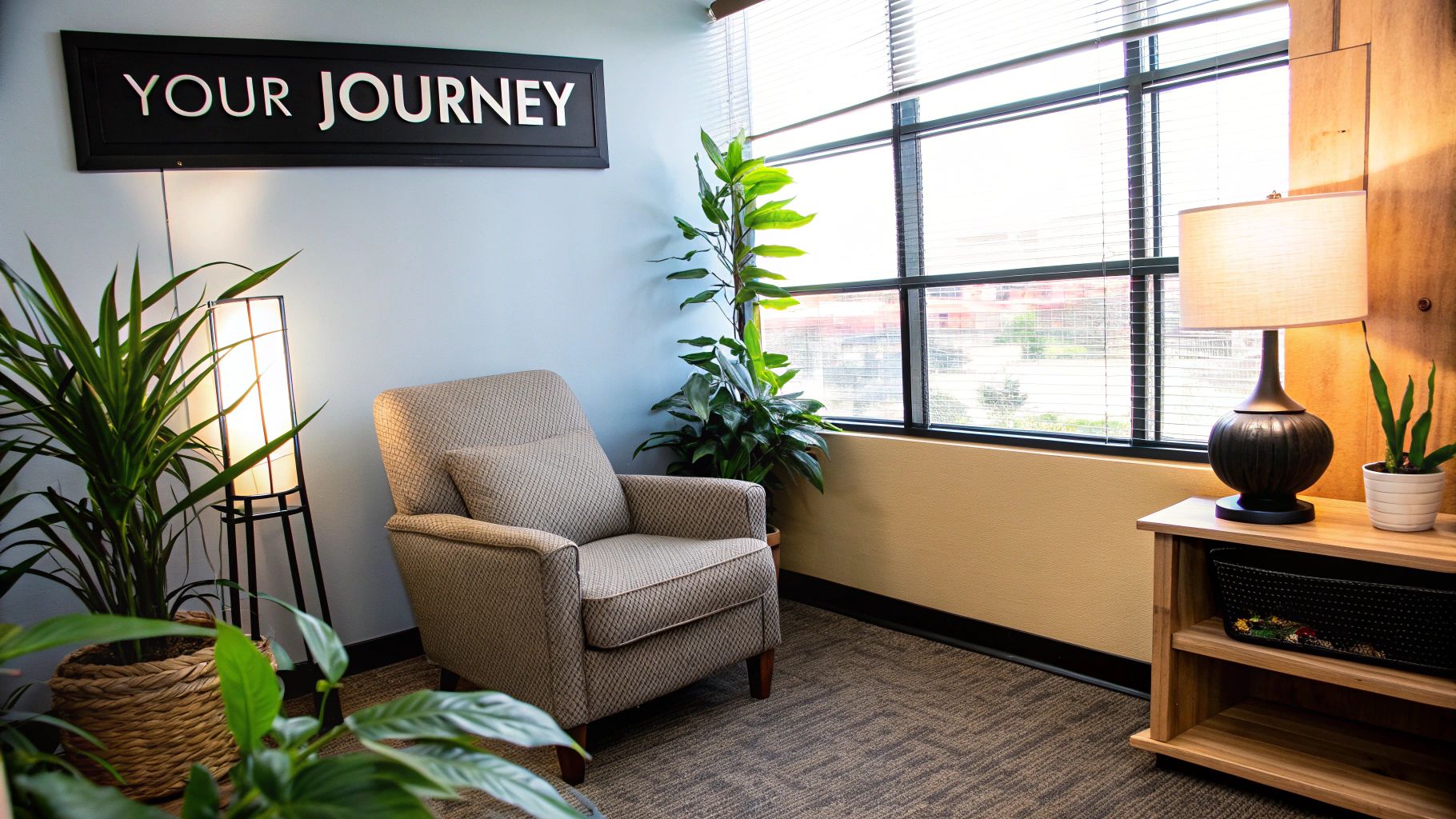
So, you’ve been searching for “drug rehab near me inpatient” and you’ve found some potential places. Now comes the hard part—actually reaching out. It can feel like a massive hurdle, but trust me, it’s the first step on a potentially life-changing journey. Let’s talk about how to make that initial contact a little less daunting.
Preparing for the Call: Know Your Stuff
Before you even pick up the phone, take a few minutes to gather some important information. Grab your insurance card and make a list of any medications you’re currently taking. Having these details ready will make the initial conversation much smoother. It also helps to jot down a few questions based on your research. This keeps you focused and ensures you get the information you need.
Think about what you want from treatment. What are your biggest worries? What kind of support are you hoping to find? Having a clear idea of your needs will help you communicate them effectively, even when you’re feeling vulnerable.
What to Expect: It’s a Conversation, Not an Interrogation
The first call is mostly about gathering information. The admissions representative will likely ask about your history with substance use, any previous treatment experiences, and your current situation. They’ll also explain the facility’s programs, their treatment philosophy, and the costs involved.
Don’t be shy about asking questions! This is your opportunity to get a feel for the place. Does it sound like the right fit for you? Remember, you’re interviewing them just as much as they’re assessing you.
The Intake Process: Be Your Own Advocate
If you decide to proceed, the next step is usually a more in-depth assessment. This could involve a phone interview, a virtual meeting, or an in-person visit. Be honest and open during this process. The more information the treatment team has, the better they can tailor a plan to your specific needs.
Starting inpatient treatment is a big decision. It’s completely normal to have anxieties or fears. Don’t hesitate to voice these concerns. The treatment team wants to support you, and knowing what you’re worried about allows them to provide the reassurance you need.
Logistics and Life Details: Practicalities Matter
Once you’re admitted, practical matters come into play. What about work? Pets? Family responsibilities? Many facilities can offer guidance on handling these arrangements. They understand that taking care of these details can free up your mind to focus on recovery.
Talking to your employer about taking leave can be stressful, but it’s important. The Family and Medical Leave Act (FMLA) might protect your job while you’re in treatment. And remember, it’s okay to ask for help. Lean on your support system for assistance with practical matters.
You’re Not Alone on This Journey
Taking that first step towards recovery is incredibly brave. It’s natural to feel fear and uncertainty. But please know, you’re not alone. Reach out to friends, family, or a support group. Talking about your feelings can make all the difference.
Organizations like Addiction Helpline America offer confidential support and guidance. Call 844-561-0606 or visit their website, https://addictionhelplineamerica.com/, to connect with compassionate professionals. They understand what you’re going through and can help you navigate the process of finding the right “drug rehab near me inpatient”. That first step is often the hardest, but it’s also the most important. You’ve got this.
Call Now – Your Journey to Recovery Begins Today!

Take the first step towards a healthier life! Call now to connect with our compassionate team and start your recovery journey today. Your path to healing awaits!
Our recovery specialists are available 24/7 to provide support, and all calls are confidential and free. Reach out anytime – we’re here to help!
The Evolving World of Addiction Treatment
Finding the right inpatient drug rehab near you means understanding that addiction treatment is a dynamic field. It’s always changing, constantly integrating new approaches to help people find lasting recovery. For example, digital health tools are becoming more and more common, offering online support and resources to bridge the gaps between therapy sessions. This ongoing support can be a game-changer for maintaining progress.
Many facilities are also incorporating holistic therapies alongside more traditional approaches. Think yoga, meditation, and art therapy – incredibly valuable tools for healing trauma and building healthy coping mechanisms. These practices work hand-in-hand with evidence-based therapies to create a more well-rounded approach to recovery. The key here is finding centers that truly integrate these methods, and aren’t just throwing around trendy buzzwords.
This evolution in treatment comes from a growing understanding that addiction is complex, and everyone’s needs are different. Personalized treatment plans, tailored to your individual background and circumstances, are more important than ever. This could mean specialized programs for specific age groups, or perhaps a deeper focus on underlying trauma – which so often fuels addiction.
The global addiction treatment market reflects this evolving approach, as well as the increasing demand for these services. In 2024, the market was valued at around $19.02 billion, with projections showing growth to $20.93 billion in 2025 and potentially $31.3 billion by 2032. This growth speaks volumes about the need for comprehensive care. You can learn more about this at the addiction treatment market.
Looking ahead, technology will likely play an even bigger role in treatment. From virtual reality therapy for processing trauma to telehealth for remote support, the possibilities are truly remarkable. Finding an inpatient drug rehab near you that’s embracing these advancements can significantly improve your chances of long-term recovery. If you’re feeling overwhelmed by the choices, remember there are resources available to help you navigate the process. Addiction Helpline America, at 844-561-0606 or https://addictionhelplineamerica.com/, can offer support and guidance in finding a program that aligns with your individual needs and incorporates these evolving treatment strategies.
Your Recovery Journey Starts With One Decision
Finding the right “drug rehab near me inpatient” takes courage, and feeling overwhelmed is perfectly normal. This isn’t a sprint, it’s a marathon, and you absolutely don’t have to go it alone. Let’s recap what we’ve talked about and make a plan to move forward. Remember, asking for help is a sign of strength, not weakness.
It’s easy to get bogged down in the details, but your focus should be on getting better.
Focusing on What Truly Matters
You’ve looked at treatment types, search strategies, how facilities market themselves, insurance issues, and the admissions process. Now, take a deep breath. What matters most is your recovery. Don’t get sidetracked comparing fancy amenities or agonizing over minor details. Find a program that feels right, one that provides evidence-based therapies and genuine, caring support. That connection is what truly makes a difference.
Finding the right fit takes time, so be patient with yourself and the process.
Call Now – Your Journey to Recovery Begins Today!

Take the first step towards a healthier life! Call now to connect with our compassionate team and start your recovery journey today. Your path to healing awaits!
Our recovery specialists are available 24/7 to provide support, and all calls are confidential and free. Reach out anytime – we’re here to help!
Setting Realistic Timelines
Finding the perfect “drug rehab near me inpatient” isn’t an overnight thing. It’s a process, like finding the right apartment or the right job. Give yourself time to do your research, ask questions, and even visit facilities if you can. There’s no magic timeframe, but expect the search to take a few weeks, maybe even a month. This isn’t about rushing; it’s about finding the environment where you can thrive.
Feeling a little lost? Here’s a plan to get things moving.
Next Steps: Your Actionable Plan
Feeling stuck? Let’s get you unstuck. Here’s a plan:
- Review your notes: Go back through everything you’ve gathered. Which facilities stood out? Which ones gave you a good feeling? Trust your gut.
- Make those calls: Contact your top choices. Talk to the admissions representatives. Ask the hard questions. Don’t be shy! This is your life we’re talking about.
- Consider a consultation: Many facilities offer free consultations. This is your chance to get a feel for the program, the staff, and the overall atmosphere. Ask specific questions about what matters to you.
- Lean on your support system: Talk to trusted friends, family members, or a therapist. Sharing your feelings and concerns can make a huge difference. You don’t have to carry this burden alone.
You’ve got this. There is support, and there is hope for a brighter future.
Remember Your Strength: Support is Available
Finding the right “drug rehab near me inpatient” can be tough, but it’s absolutely doable. Remember, you’re not alone in this. Addiction Helpline America offers compassionate, confidential support. Their experienced professionals can guide you through the process, answer your questions, and help you find the best treatment center for your individual needs. Call 844-561-0606 or visit their website. Take that next step. You deserve a healthy, fulfilling life free from addiction. Addiction Helpline America is there to help you find it.
Our helpline is 100%
free & confidential
If you or someone you care about is struggling with drug or alcohol addiction, we can help you explore your recovery options. Don’t face this challenge alone—seek support from us.
Programs
Resources
Will my insurance
cover addiction
treatment?
We're ready to help
Find the best
drug or alcohol treatment
center
Are you or a loved one struggling with addiction? Call today to speak to a treatment expert.





